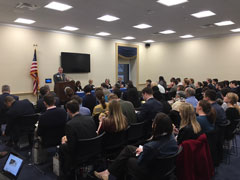February 6, 2018
Vice President for Research Peter Dorhout briefs congressional staff on the value of supporting basic science funding

Peter Dorhout, K-State vice president for research, provided opening comments before a panel discussion for congressional staff on the value of National Science Foundation funding of basic science on Feb. 1. Dorhout used the development of Clustered Regularly Interspaced Short Palindromic Repeats, or CRISPR, as an example of an NSF-supported advancement.
"Only with an ally as strong as the NSF, our leading advocate for fundamental research in these critical times, could such meaningful and significant advancements in applied problem-solving be possible," Dorhout said.
Dorhout also underscored the necessity of funding a wide range of scientific endeavors to maintain U.S. competitiveness and leadership in global fundamental science research given growing investment in research and development in other countries.
"According to the latest biennial Science and Engineering Indicators report issued by the National Science Board, R&D outlays from 2000 to 2015 for basic research show an average annual growth for some countries that greatly exceeds that in the U.S., which has averaged about 4 percent. The NSF, and consequently our own growth in fundamental research, has effectively been hamstrung by these funding challenges," Dorhout said.
Panelists at the event were professors Jennifer Doudna and David Schaffer from the University of California, Berkeley and NSF biology program officer Joann Tornow. Science magazine writer Jocelyn Kaiser served as moderator.
Dorhout is serving as 2018 president of the American Chemical Society. The briefing was a joint effort between the American Chemical Society and the American Society for Biochemistry and Molecular Biology.
